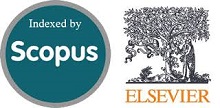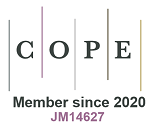Digital Competencies Development in Higher Education Institutions: A Mixed Methods Research Study
Abstract
Objective: Learning to teach at the higher education level is not a straightforward path in Slovakia, and there are fewer opportunities to learn how to teach at this level. The paper summarizes selected findings and proposals for improvements related to the implementation of measures in selected areas of higher education institutions (HEI). The aim of the paper was to explore digital competency development in higher education institutions and factors with regard to university lecturers that affect the quality of the educational process in the context of the overall quality of graduates and labor market requirements. In addition, our study aims to fill an information gap and provide original data useful in the process of digital competency development in higher education. Methods/Analysis: The study employed an exploratory mixed-methods design. The data for this study is based on a survey with 24 open and closed questions and an analysis of 46 final thesis studies. Findings: Both the qualitative statements of the university lecturers and the survey shed light on the following: (1) (Re)creation of motivational factors; (2) Potential development of digital competencies; and (3) Supporting innovation in higher education. The results led to consideration of the educational process quality at the level of the subject and the object of education. Novelty/Improvement: The results point to the importance of investment in technology. This is related to improved educational outcomes and sustainable innovation in higher education. Slovak national education policymakers should provide innovative ways to increase the development of digital competencies in higher education institutions through the Recovery Plan for Europe; providing investment in technology related to improved educational outcomes and the development of sustainable innovation in higher education will all help to raise the standard.
Doi: 10.28991/ESJ-2022-SIED-011
Full Text: PDF
Keywords
References
Blaskova, M., Blasko, R., Figurska, I., & Sokol, A. (2015). Motivation and development of the university teachers’ motivational competence. Procedia-Social and Behavioral Sciences, 182, 116-126. doi:10.1016/j.sbspro.2015.04.746.
Han, J., & Yin, H. (2016). Teacher motivation: Definition, research development and implications for teachers. Cogent Education, 3(1), 1217819. doi:10.1080/2331186X.2016.1217819.
Kompf, M., & Denicolo, P. M. (2013). Critical issues in higher education. Sense Publishers, Netherlands. doi:10.1007/978-94-6209-046-0.
Bilbao-Aiastui, E., Arruti, A., & Morillo, R. C. (2021). A systematic literature review about the level of digital competences defined by DigCompEdu in higher education. Aula Abierta, 50(4), 841–852. doi:10.17811/RIFIE.50.4.2021.841-850.
Caena, F., & Redecker, C. (2019). Aligning teacher competence frameworks to 21st century challenges: The case for the European Digital Competence Framework for Educators (Digcompedu). European Journal of Education, 54(3), 356–369. doi:10.1111/ejed.12345.
Zhou, X., & Milecka-Forrest, M. (2021). Two groups separated by a shared goal: How academic managers and lecturers have embraced the introduction of digital technologies in UK higher education. Research in Learning Technology, 29, 1–18. doi:10.25304/rlt.v29.2446.
Basilotta-Gómez-Pablos, V., Matarranz, M., Casado-Aranda, L. A., & Otto, A. (2022). Teachers’ digital competencies in higher education: a systematic literature review. International Journal of Educational Technology in Higher Education, 19(1), 8. doi:10.1186/s41239-021-00312-8.
González-Geraldo, J. L., Monroy, F., & Igea, B. D. R. (2021). Impact of a Spanish higher education teacher development programme on approaches to teaching. Psychometric properties of the S-ATI-20 scale. Educacion XX1, 24(1), 213–232. doi:10.5944/educXX1.26725.
EU Science HUB. (2022). Are you making the most of digital technologies for teaching and learning?. Available online: https://educators-go-digital.jrc.ec.europa.eu/ (accessed on June 2022).
Cabero-Almenara, J., Gutiérrez-Castillo, J. J., Palacios-Rodríguez, A., & Barroso-Osuna, J. (2020). Development of the teacher digital competence validation of DigCompEdu check-in questionnaire in the University context of Andalusia (Spain). Sustainability (Switzerland), 12(15), 6094. doi:10.3390/su12156094.
Kluzer, S., & Priego, L. P. (2018). Digcomp into action: Get inspired, make it happen. a user guide to the european digital competence framework (No. JRC110624). Joint Research Centre (Seville site), Seville, Spain.
Sirotová, M., Michvocíková, V., & Hostoveckỳ, M. (2021). Serious games in university education of future teachers. Peter Lang verlag, Berlin, Germany. doi:10.3726/b18088.
Mbombo, A. B., & Cavus, N. (2021). Smart University: A University In the Technological Age. TEM Journal, 10(1), 13–17. doi:10.18421/TEM101-02.
De Wit, H. (2011). Globalisation and internationalisation of higher education. International Journal of Educational Technology in Higher Education, 8(2), 241-248.
Teichler, U. (2017). Internationalisation Trends in Higher Education and the Changing Role of International Student Mobility. Journal of International Mobility, N° 5(1), 177–216. doi:10.3917/jim.005.0179.
Kuna, P., Hodál, P., & Hašková, A. (2019). Assessment of the Employee Education: Case Study Aimed At Industrial Production Practice. ICERI2019 Proceedings, 1, 3006–3010. doi:10.21125/iceri.2019.0767.
Zlate, S., & Cucui, G. (2015). Motivation and performance in higher education. Procedia-Social and Behavioral Sciences, 180, 468-476. doi:10.1016/j.sbspro.2015.02.146.
Leal Filho, W., Levesque, V. R., Salvia, A. L., Paço, A., Fritzen, B., Frankenberger, F., … , & Lovren, V. O. (2021). University teaching staff and sustainable development: an assessment of competences. Sustainability Science, 16(1), 101–116. doi:10.1007/s11625-020-00868-w.
Damuluri, S., Islam, K., Ahmadi, P., & Qureshi, N. S. (2020). Analyzing Navigational Data and Predicting Student Grades Using Support Vector Machine. Emerging Science Journal, 4(4), 243–252. doi:10.28991/esj-2020-01227.
OECD (Organization for Economic Co-operation and Development). (2016). Innovating Education and Educating for Innovation-The Power of Digital Technologies and Skills. OECD Publishing, Washington, United States. doi:10.1787/9789264265097-en.
OECD (Organisation for Economic Co-operation and Development). (2018). The future of education and skills: Education 2030. OECD Education Working Papers, Paris, France.
Serdyukov, P. (2017). Innovation in education: what works, what doesn’t, and what to do about it? Journal of Research in Innovative Teaching & Learning, 10(1), 4–33. doi:10.1108/jrit-10-2016-0007.
Darling-Hammond, L., Flook, L., Cook-Harvey, C., Barron, B., & Osher, D. (2020). Implications for educational practice of the science of learning and development. Applied Developmental Science, 24(2), 97–140. doi:10.1080/10888691.2018.1537791.
Kaputa, V., Loučanová, E., Tejerina-Gaite, F.A. (2022). Digital Transformation in Higher Education Institutions as a Driver of Social Oriented Innovations. Social Innovation in Higher Education. Innovation, Technology, and Knowledge Management. Springer, Cham, Switzerland. doi:10.1007/978-3-030-84044-0_4.
University Pedagogy Course Project (2018). Implementation period 2018 - 2019. Faculty of Economics and Management SUA in Nitra. (2018). Slovak University of Agriculture (SUA), Nitra, Slovakia. Available on archival of Center of Pedagogy and Psychological counselling of SUA in Nitra. (In Slovak).
Sirotová, M., & Michvocíková, V. (2021). Virtual Reality – Part of Supervised Teaching Practice for University Students – Future Teachers? European Journal of Contemporary Education, 10(1), 127–136. doi:10.13187/ejced.2021.1.127.
UNESCO ICT. (2011). Competency framework for teachers. United Nations Educational, Scientific and Cultural Organization, Paris, France. Available online: https://iite.unesco.org/pics/publications/en/files/3214694.pdf (accessed on March 2022).
Ambrozy, M., & Šagát, P. (2019). Axiological aspect in the context of teaching philosophy. XLinguae, 12(3), 218–227. doi:10.18355/XL.2019.12.03.16.
Záhorec, J., Hašková, A., Poliaková, A., & Munk, M. (2021). Case study of the integration of digital competencies into teacher preparation. Sustainability (Switzerland), 13(11), 6402. doi:10.3390/su13116402.
Ally, M. (2019). Competency profile of the digital and online teacher in future education. International Review of Research in Open and Distance Learning, 20(2), 302–318. doi:10.19173/irrodl.v20i2.4206.
Gudmundsdottir, G. B., & Hatlevik, O. E. (2018). Newly qualified teachers’ professional digital competence: implications for teacher education. European Journal of Teacher Education, 41(2), 214–231. doi:10.1080/02619768.2017.1416085.
Tømte, C.; Kårstein, A.; Olsen, D.S. (2013) ICT in Teacher Training: Towards Profession Professional Digital Literacy?. Nordic Institute for Studies in Innovation, Research and Education (NIFU), Oslo, Norway. (In Norwegian). Available online: https://nifu.brage.unit.no/nifu-xmlui/handle/11250/280429 (accessed on March 2022).
Julio, C. A., Guillén-Gámez, F. D., Ruiz-Palmero, J., & Palacios-Rodríguez, A. (2021). Digital competence of higher education professor according to DigCompEdu. Statistical research methods with ANOVA between fields of knowledge in different age ranges. Education and Information Technologies, 26(4), 4691-4708. doi: 10.1007/s10639-021-10476-5.
Timmis, S., & Muhuro, P. (2019). De-coding or de-colonising the technocratic university? Rural students’ digital transitions to South African higher education. Learning, Media and Technology, 44(3), 252-266. doi: 10.1080/17439884.2019.1623250.
Zhao, Y., Pinto Llorente, A. M., & Sánchez Gómez, M. C. (2021). Digital competence in higher education research: A systematic literature review. Computers and Education, 168, 104212. doi:10.1016/j.compedu.2021.104212.
Creswell, J. W., & Creswell, J. D. (2017). Research design: Qualitative, quantitative, and mixed methods approaches. Sage Publications, Newbury Park, United States.
Bowen, G. A. (2009). Document analysis as a qualitative research method. Qualitative Research Journal, 9(2), 27–40. doi:10.3316/QRJ0902027.
Neuendorf, K. A. (2017). An integrative approach to content analysis. The content analysis guidebook, 36-69, Sage Publications, Newbury Park, United States. doi:10.4135/9781071802878.n2.
Graneheim, U. H., Lindgren, B. M., & Lundman, B. (2017). Methodological challenges in qualitative content analysis: A discussion paper. Nurse Education Today, 56(2), 29–34. doi:10.1016/j.nedt.2017.06.002.
Groves, R. M., Fowler Jr, F. J., Couper, M. P., Lepkowski, J. M., Singer, E., & Tourangeau, R. (2011). Survey methodology. John Wiley & Sons, Hoboken, United States.
Wilson, A. (2015). A guide to phenomenological research. Nursing Standard, 29(34), 38–43. doi:10.7748/ns.29.34.38.e8821.
Mendoza, J. M. F., Gallego-Schmid, A., & Azapagic, A. (2019). A methodological framework for the implementation of circular economy thinking in higher education institutions: Towards sustainable campus management. Journal of cleaner production, 226, 831-844. doi: 10.1016/j.jclepro.2019.04.060.
Abad-Segura, E., & González-Zamar, M. D. (2021). Sustainable economic development in higher education institutions: A global analysis within the SDGs framework. Journal of Cleaner Production, 294, 126133. doi: 10.1016/j.jclepro.2021.126133.
Vančo, I. (2016). Analýza získavania prierezových kompetencií na slovenských vysokých školách. Ministry of Education, Science, Research and Sports of the Slovak Republic, Bratislava, Slovakia. Available online: https://www.minedu.sk/analyza-ziskavania-prierezovych-kompetencii-na-slovenskych-vysokych-skolach-2016/ (accessed on June 2022). (In Slovak).
Chu, S. K. W., Reynolds, R. B., Tavares, N. J., Notari, M., & Lee, C. W. Y. (2021). 21st century skills development through inquiry-based learning from theory to practice. Springer International Publishing, Singapore.
Hrydzhuk, O., Struhanets, L., & Struhanets, Y. (2021). Information technologies in language education during the COVID-19 pandemic. XLinguae, 14(1), 197–211. doi:10.18355/XL.2021.14.01.16.
van der Spoel, I., Noroozi, O., Schuurink, E., & van Ginkel, S. (2020). Teachers’ online teaching expectations and experiences during the Covid19-pandemic in the Netherlands. European Journal of Teacher Education, 43(4), 623–638. doi:10.1080/02619768.2020.1821185.
Ali, W. (2020). Online and Remote Learning in Higher Education Institutes: A Necessity in light of COVID-19 Pandemic. Higher Education Studies, 10(3), 16. doi:10.5539/hes.v10n3p16.
Mahmood, S. (2021). Instructional Strategies for Online Teaching in COVID-19 Pandemic. Human Behavior and Emerging Technologies, 3(1), 199–203. doi:10.1002/hbe2.218.
Tsang, J. T. Y., So, M. K. P., Chong, A. C. Y., Lam, B. S. Y., & Chu, A. M. Y. (2021). Higher education during the pandemic: The predictive factors of learning effectiveness in covid-19 online learning. Education Sciences, 11(8), 446. doi:10.3390/educsci11080446.
Šolcová. J. & Nemcová, L. (2021). Non-formal learning as part of the training of future youth workers. Youth and Society: Slovak Journal for Policy and Youth Research, 27(1), 34 - 47.
Hosťovecký, M., Ölvecký, M., Pribilová, K. (2020). Paidagogos S.G.: Development and Programming of the Serious Game Application. Intelligent Algorithms in Software Engineering, CSOC 2020, Advances in Intelligent Systems and Computing, 1224, Springer, Cham, Switzerland. doi:10.1007/978-3-030-51965-0_53.
The Ministry of Education, Science, Research and Sport of the Slovak Republic (2022). The Recovery Plan for Europe. (Plan obnovy a odolnosti). Available online: https://www.minedu.sk/plan-obnovy-a-odolnosti/ (accessed on March 2022).
DOI: 10.28991/ESJ-2022-SIED-011
Refbacks
- There are currently no refbacks.
Copyright (c) 2022 Miroslava Tokovska, Tímea Šeben Zaťková, Ľubica Jamborová






